当前城市:淄博[切换]
- 手机雅思无忧

扫码登录
雅思考试主要是通过对考生听、说、读、写四个方面英语能力的考核,综合测评考生的英语沟通运用能力,实现“沟通为本”的考试理念。对于雅思考生来说,也有很多考试难点和政策盲区需要帮助解答。今天雅思无忧网小编准备了雅思10月口语考试题库 雅思口语考试时被考官问了很多问题!!SORRY,金币没了...,希望通过文章来解决雅思考生这方面的疑难问题,敬请关注。
很多烤鸭都跟小昂反应,在口语考试中,考官一直在纸上写东西,还遮遮掩掩的,大家普遍认为考官在写自己的失分点和分数,一些心理素质不好的烤鸭甚至会因为考官的这种表现而影响自己的发挥!
今天就给大家揭秘一下,口语考试中,考官究竟在写什么!
其实,在雅思口语考试中,考官是在记录你们的答题时间,以便于控制整场考试每一部分的节奏,让每位考生都拥有同样的时间作答每部分内容,以确保考试公正性。
说到时间,大家都知道口语考试分为罩贺3部分,总共11-14分钟,那么大家清楚这三部分的具体时长以及具体考察的方向吗?
Part 1
口语考试的第一部分是daily conversation。考官需要把烤鸭们的回答时间控制在4-5分钟。这部分考官会引导你们从自我介绍开始对话,而后主要围绕大伙儿熟悉的话题如朋友,兴趣爱好等展开。这部分主要考察大家就日常性的观点和信息、常见的生活经历等进行交流的能力。
Part 2
第二部分,考官会根据随机选择试题卡上的问题提问。大家有1分钟的准备时间,可用笔纸稍作整理回答要点,然后根据要求对话题进行2分钟的个人观点阐述。考官会在2分钟后打断考生,并在最后提问一两个问题作为结束语。这部分大家可以结合自己的经历完成这部分内容,主要考察在没有任何其它提示的情况下就一个特定的话题进行较长时间的陈述的能力,是否能恰当地运用语言、是否能连贯地组织自己的观点。
Part 3
口语考试的最后一部分是双向讨论,考官与考生会就第二部分所提及的皮闷芦话题进行更深入的讨论。这一阶段讨论内容往往灵活不定,同时也加重了与考官的互动,主要注重考察你们分析、讨论以及深入思考问题的能力的英文沟通和应变能力。最后一部分考官会将时间控制在4-5分钟。
在参加完考试后,总听到有人在感叹:“一眨眼的工夫,我的口语测试咋就结束了。当考官说考试结束的时候,我真想说:“请您再多问几个问题吧,我还有大把的心里话可以说呢。是不是他根本听不懂我的回答,因燃带此没有然后了…”这种情况往往是考官在考生考试时用了所能允许的最短时间。
为什么会用最短时间呢?可能仅是因为在这段时间内,考官已经从你的回答中得到足够的信息来评定你的口语水平,无需再继续进行剩余三四分钟的考试。只要大家以正常语速回答问题,考官就能最短在11分钟内评定你的英语口语水平。因此,多数烤鸭们的口语测试时间大约为11到12分钟。 但有时,考官也会对考生进行14分钟的最长时间的测试。
另一方面,考试时间较长也可能是因为正面的因素:例如,水平很高的考生在回答第3部分问题时往往会给出比较详细的答案,这样就会需要更多时间。而且,如果考官很赞赏你的回答,考试时间也会在允许的范围内较长。最重要的一点是考生不会在11分钟之前结束口语测试。反之也是一样,我们的考官最多也只可以利用14分钟的时间对考生的口语能力作出合理的评定。
换句话说,11到14分钟之间的额外时间是用来确定以下几点:
在第1、3部分应该提问足够多的问题;
考生有机会陈述观点;
对考生作出的评定确认是准确的。
因此,口语考试时,考官不仅需要对你的英语沟通和表达能力做出评判,他们还是一个严格的time keeper,既要控制整体的考试时长,更要对口语考试的每一部分所花费的时间进行记录以便严格把控,所以大家无需担心,也不必紧张。要想在雅思口语考试中取得好成绩,烤鸭们最重要的还是要按照口语考试中每部分所考察的内容以及评分标准来练扎实基本功,并在考试中保持自信!千万别再被那些“小插曲”转移注意力呢!
part 1
基本信息题
1 Name
What’s your full name?
What name do people at home call you?
Does your name have any special meaning?
Would you like to change your name?
Do Chinese people attach a lot of importance to names?
2 Hometown
What do you like about your hometown?
Did you learn much about the history about your hometown?
Has the weather in your hometown changed much in recent years?
What facilities does your hometown have?
3 Accommodation
Can you describe the place where you live?
Please describe the room you 握冲源live in.
Are the transport facilities near your home very good?
How well do you know your neighbors?
Would you say the place where you live is good for families with children?
4 Work/Study
Do you work or are you a student?
What is your favorite subject at school?
What is your future work plan?
What do you like about your work?
5 Shoe
What kind of shoes do you like?
Where do you shop for shoes?
Do you prefer comfortable shoes or pretty shoes?
6 Friend
Do you have many close friends?
What do you usually do with your friends?
How long have you known your best friend?
7 Food/Fruits
Do you think there are any benefits from eating breakfast?
What do you consider to be a healthy diet?
Are you willing to try some new food?
What’s your favorite fruit?
8 Laughing
When would people usually laugh?
Do you enjoy laughing?
Is laughing beneficial to health?
9 Handwriting
Do you prefer handwriting or typing?
Will handwriting be replaced by typing in the future?
10 Nature
Do you enjoy nature?
What could people do to protect our natural environment?
11 Camping
Do you like camping?
Have you ever had camping experience before?
Is camping very popular in your country?
技能类
12 Cars
Do you like cars?
Do you have a driver’s license?
If you wanted to buy a car, what kind 段态of car would you choose?
Do you like travelling by car?
13 Languages
What foreign languages 判局have you studied?
Do Chinese people have many opportunities to practice oral English?
What is the most difficult part about studying a foreign language?
14 Dictionary
Do you often use dictionary?
What kind of dictionary do you prefer to use?
What are the benefits of using dictionaries for kids?
15 Map
Do you use maps?
Do you think map is important?
Do you prefer to use electronic maps or those made of paper?
高频题(喜好,偏向类居多)
16 Noise
Are you often bothered by noise?
What natural sounds do you like the most?
What are some places where there is a lot of noise?
17 Street Market
Do you like visiting street market?
What is usually sold in these street markets?
Would you like to visit a street market in a foreign country?
Do people in your country prefer to shop at a street market or in normal malls?
18 Shopping
Do you like shopping?
Is there anything you don’t like about shopping?
Do you enjoy shopping alone or with others?
19 On-Line Shopping
Do you like shopping on line?
What are the benefits of shopping on line?
20 Housework
Do you usually do any housework?
Do you think it’s important for children to do some housework?
21 TV
What kind of TV program do you like to watch?
What kind of TV program is popular in China?
How do you feel about advertisements on TV?
22 Color
What’s your favorite color?
Do you usually wear clothes in your favorite color?
Do you think color is important in our daily life?
Are there any colors you dislike?
23 Concentration
Is it easy to concentrate on things?
How to make children concentrate on things?
24 Reading
Do you like reading?
Do you like reading in the morning or in the afternoon?
What kind of books do you like to read?
25 Cycling
Do you like riding bicycles?
Are bicycles very popular in China?
What are the benefits of riding bicycles?
26 Birthday
What do you usually do on your birthdays?
What do Chinese people usually do on their birthdays?
Is birthday still important to you?
27 Teachers
Do you like your teachers?
What do you think of your teachers?
When you were in school, did your teacher have an influence on you?
What qualities should a good teacher have?
28 Politeness
Is being polite very important?
Who taught you to be polite?
29 Time Management
Do you often wear a watch?
Is being on time important?
How do you feel when others are late?
30 Toy
What kind of toy did you like to play when you were little?
Are there any differences between the toys today and toys in the past?
Why are some *s still keeping their childhood toys?
写作
以上为04年1月至11月的雅思作文TASK1的题型出现的频率,由此可见,柱形图以及表格图出现的频率是最高的,均为17次;;而饼图、线图以及前几年并不常常出现的流程图并列第二,出现的次数为6次;地图以及混合图到目前为止出现的频率最低,只有4次
因此,从数量上来分析,已经遥遥领先的柱形图和表格图出现的机率可能降低,然而并列第二中的两种图形即饼图以及线图则在接下来一个多月的考试中很有可能再次出现,混合图以及地图出也需要考生好好准备,切勿掉以轻心。
TASK2
展示一下2021年主要出现频率,14年最后的几场考试中大作文考生们可以重点准备传媒类、文化和环境类的内容和语料,其次是社会和教育类。
建议准备如下题目:
1. We have a population with a mix of cultures and ethnics in a country. Why is this the case?And has this become a positive or negative development?(文化类)
2. Some people think we should invent a new language that can be used by people all over the world for international communication. Do you think its benefits would outweigh the problems?(文化类)
3. Some people believe that news media is influencing people’s lives and just brings negative effects today. To what extent do you agree or disagree?(传媒类)
4. Newspapers have great influence on people’s opinions and ideas. What are the reasons of the phenomenon and *yze the positive and negative effects of the phenomenon.(传媒类)
5. Many people believe that scientific research should be carried out and controlled by governments rather than private companies. To what extent do you agree or disagree?(*类)
6. Some people think that individuals are not able improve the environment, only government and companies can make a difference. To what extent do you agree or disagree?(*类)
7. In some countries, it is possible for people to have a variety of food that has been transported from all over the world. To what extent do you think its benefits outweigh the drawbacks? (社会现象类)
8. People nowadays are living in societies where consumer goods are relatively cheaper to buy. Do you think the advantages outweigh the disadvantages? (社会现象类)
9. Recently, children are spending much time on TV instead of active and creative things, why do you think this is a case? What measures will be helpful to change this problem? (教育类/report)
10. Today, more and more students are choosing to move to other cities to have higher education. Do you think the benefits outweigh the drawbacks? (教育类)
环球教育老师为同学们带来雅思口语变题季口语提分攻略如下,希望对您的备考有所帮助~
雅思口语考试学生都了解每一年1、5、9月是雅思口语考试的变题季,实际上学生们无需过度担忧,接下来我们一起学习雅思口语变题季口语提分攻略:
最先,Part One考题只不过就是说两层面难题。其一,是本人的基本信息。对这种问题自然轻轻松松。其二,就是说一些衣食住行附蔽陪近的话题讨论,只能极少数的丰富性话题讨论,才必须大伙儿在临考提早关心备考一下。
小编提示大伙儿,下列好多个话题讨论:Name, hometown, study or work, accommodation, free time是长期出现在试题之中,因此考生们一定要好好地提前准备。除开这五个基本的不可以再基本的话题讨论,还有一个话题讨论必须大伙儿留意:weather,这一话题讨论也十分基本。
除此之外,针对上一考期的英语口语“新题”,小编建议大伙儿也一定要了解一下,如Snack, being in a hurry, social networking, staying up late, 在接下去的考期之中还应当最多多的留意。
下面针对变题季,小编为大家列了一些话题,它们都有在新题库中出现的可能:Concentration 近几个考季经常出现在题库当中, 算是一个老生常谈的话题了,没太高的度系数, 只需要大家知道什么情况你可以集中注意力, 什么东西可以分散你的注意力等。
Patience 你是一个有耐心的人吗?觉得耐心重要吗?上次失去耐心是什么时候? Wedding 参加过婚礼吗?参加谁的都可以,不一定非得是自己的。婚礼的时候,人们都干嘛?送什么礼物?上次参加谁的婚礼什么时候?问来问去还是时态。还有一些话题,环球教育口语单项班老师就不在此一一列举了。
最后,应对口语变题季,小编要提醒大家那些“老题换新颜“的一类话题,像音乐、公共交通等。它们在新的题库中,很可能以一个新的面目出现。
不知道以上内容能否对您的雅思备考有些许帮助,如有雅思备考相关问题可以在评论区交流讨论~~看见后第一时间为同学们解答疑问,希望同学们都可以取得理想的雅思分数~
环球教育秉持教育成就未来的理念,专注于为中国学子提供优质的出国语言培训及配套服务。环球教育在教学中液并数采用“九步闭环法”,帮助学生快速提升学习效能,同时提供优质的课后服务,跟进学生学习进程,为优质教学提供坚强的保障。目前,环球教育北京学校已构建了包含语言培训、出国咨询、国际课程、闹首游学考察、在线课程等在内的一站式服务教育生态圈。相关问题可在线免费咨询,或拨打免费热线400-616-8800~~
以上就是雅思无忧网为您准备的雅思10月口语考试题库 雅思口语考试时被考官问了很多问题!!SORRY,金币没了...全部内容。访问雅思无忧网(https://www.yasi.cn/),了解更多雅思考试新消息,新动态。
雅思培训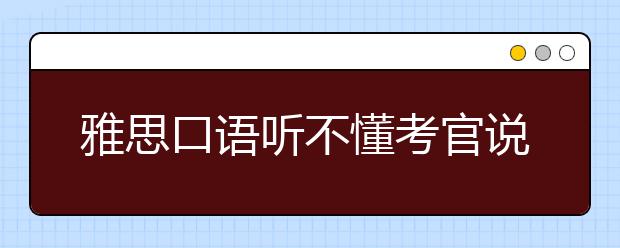 雅思口语听不懂考官说什么怎么办?能说sorry吗?
雅思口语听不懂考官说什么怎么办?能说sorry吗?
雅思口语考试中,很多考生听不懂或者没有听清考官在说什么,就直接说了句“sorry”,那么这样说可以吗
2021年08月12日 15:13 雅思口语考试不能只说Sorry?
雅思口语考试不能只说Sorry?
雅思口语考一般都有些什么禁忌呢?不能只说Sorry吗?经过分析,小编发现在进行口语考的时候,考生还真
2021年11月25日 18:43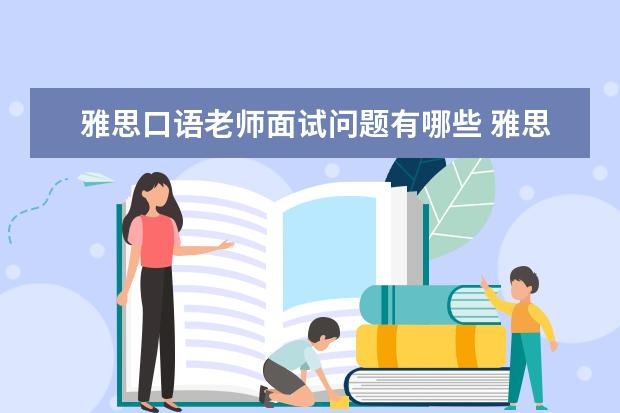 雅思口语老师面试问题有哪些 雅思口语考试时被考官问了很多问题!!SORRY,金币没了...
雅思口语老师面试问题有哪些 雅思口语考试时被考官问了很多问题!!SORRY,金币没了...
雅思考试主要是通过对考生听、说、读、写四个方面英语能力的考核,综合测评考生的英语沟通运用能力,实现“
2023年08月06日 06:20 雅思口语面试问题汇总及答案解析 雅思口语考试时被考官问了很多问题!!SORRY,金币没了...
雅思口语面试问题汇总及答案解析 雅思口语考试时被考官问了很多问题!!SORRY,金币没了...
雅思考试主要是通过对考生听、说、读、写四个方面英语能力的考核,综合测评考生的英语沟通运用能力,实现“
2023年08月06日 14:09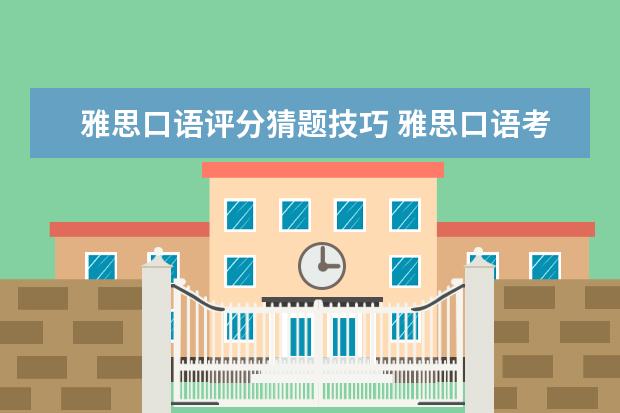 雅思口语评分猜题技巧 雅思口语考试时被考官问了很多问题!!SORRY,金币没了...
雅思口语评分猜题技巧 雅思口语考试时被考官问了很多问题!!SORRY,金币没了...
雅思考试主要是通过对考生听、说、读、写四个方面英语能力的考核,综合测评考生的英语沟通运用能力,实现“
2023年09月09日 02:42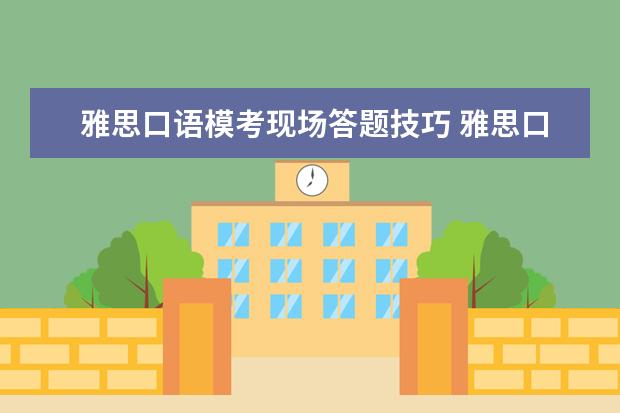 雅思口语模考现场答题技巧 雅思口语考试时被考官问了很多问题!!SORRY,金币没了...
雅思口语模考现场答题技巧 雅思口语考试时被考官问了很多问题!!SORRY,金币没了...
雅思考试主要是通过对考生听、说、读、写四个方面英语能力的考核,综合测评考生的英语沟通运用能力,实现“
2023年09月10日 10:36 雅思口语考官多问答题技巧 雅思口语考试时被考官问了很多问题!!SORRY,金币没了...
雅思口语考官多问答题技巧 雅思口语考试时被考官问了很多问题!!SORRY,金币没了...
雅思考试主要是通过对考生听、说、读、写四个方面英语能力的考核,综合测评考生的英语沟通运用能力,实现“
2023年09月10日 14:36 雅思口语话题库几个选择题 雅思口语考试时被考官问了很多问题!!SORRY,金币没了...
雅思口语话题库几个选择题 雅思口语考试时被考官问了很多问题!!SORRY,金币没了...
雅思考试主要是通过对考生听、说、读、写四个方面英语能力的考核,综合测评考生的英语沟通运用能力,实现“
2023年09月13日 06:57 雅思口语话题库几个题 雅思口语考试时被考官问了很多问题!!SORRY,金币没了...
雅思口语话题库几个题 雅思口语考试时被考官问了很多问题!!SORRY,金币没了...
雅思考试主要是通过对考生听、说、读、写四个方面英语能力的考核,综合测评考生的英语沟通运用能力,实现“
2023年09月13日 11:06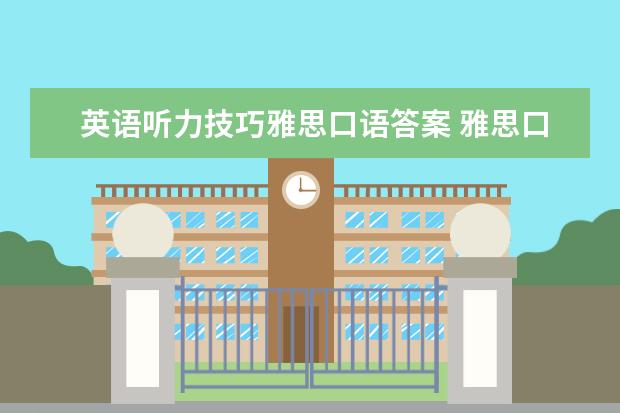 英语听力技巧雅思口语答案 雅思口语考试时被考官问了很多问题!!SORRY,金币没了...
英语听力技巧雅思口语答案 雅思口语考试时被考官问了很多问题!!SORRY,金币没了...
雅思考试主要是通过对考生听、说、读、写四个方面英语能力的考核,综合测评考生的英语沟通运用能力,实现“
2023年09月14日 06:33